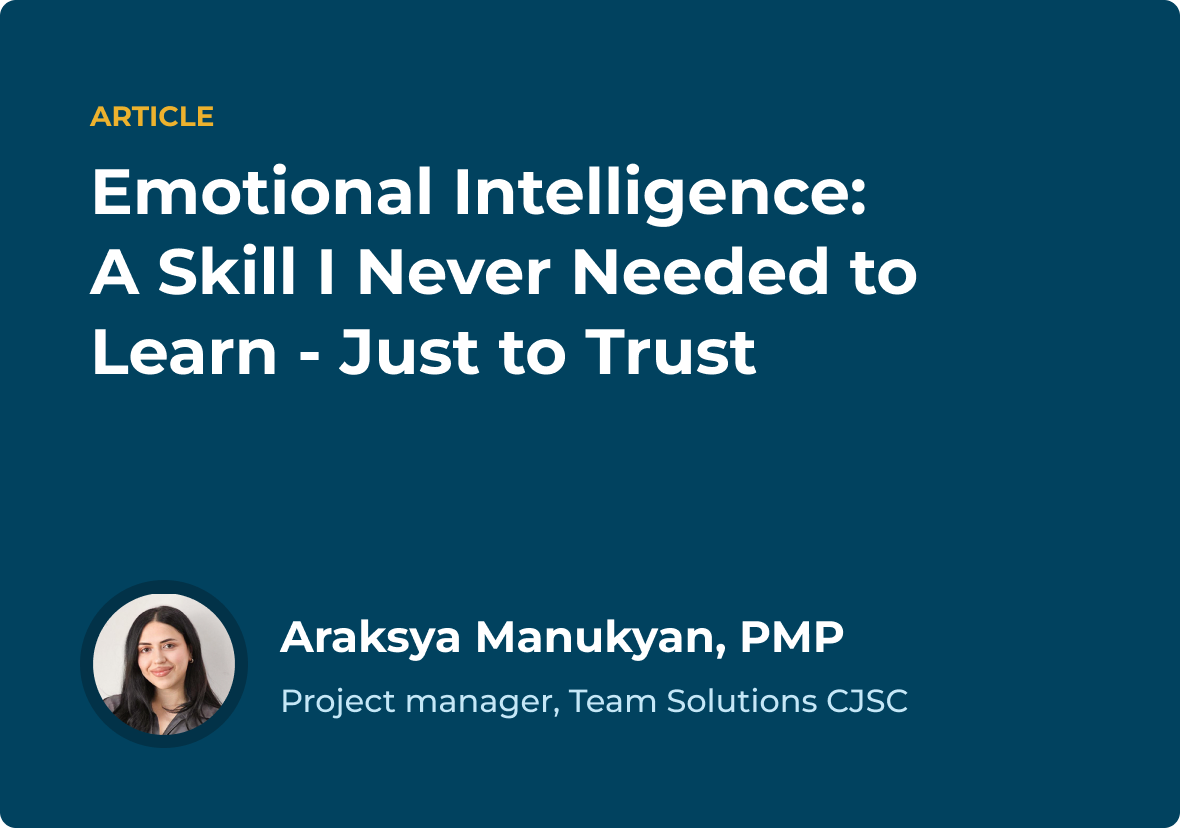
Emotional Intelligence:
A Skill I Never Needed to Learn - Just to Trust
![]() By Araksya Manukyan
By Araksya Manukyan
![]() August 4, 2025
August 4, 2025

![]() By Araksya Manukyan
By Araksya Manukyan
![]() August 4, 2025
August 4, 2025
What does it really mean to be professional?
Is it about being neutral, detached, always composed — or is it about being human, aware, and connected to the people around you?
For a long time, I wasn’t sure. I used to question whether I was too emotionally involved in my work. I care deeply about the people I work with — how they feel, how they’re handling pressure, what they’re not saying out loud. But part of me wondered if that kind of empathy would be seen as a weakness. Should I become a little colder to be taken more seriously? Should I be more “technical,” more distant, to match what others expected from a manager?
Then I had a conversation that shifted my perspective completely.
During the meeting with the CEO of a large, well-known company, I asked him a simple question: “What makes someone a good manager?” Without hesitation, he said, “The one who cares.”
That moment stayed with me. It reminded me that the point isn’t to suppress who I am — it’s to use it well. Emotional intelligence wasn’t something I had to learn from scratch. It was something I already had, and just needed to trust.
Scientifically speaking, emotional intelligence (EI) is the ability to recognize, understand, manage, and influence emotions — both your own and those of others. The term was popularized by psychologist Daniel Goleman, who outlined five key elements: self-awareness, self-regulation, motivation, empathy, and social skills.
But definitions aside, emotional intelligence is simply this: the ability to connect, understand, and respond thoughtfully to what’s going on beneath the surface — especially in a team.
In today’s workplace, Goleman’s insights are more relevant than ever. As organizations navigate hybrid teams, rising burnout, and the growing need for psychological safety, emotionally intelligent leadership has become a cornerstone of effective management. Leaders who demonstrate empathy, self-awareness, and strong interpersonal skills are not only better equipped to handle change and conflict — they also foster trust, boost team morale, and drive long-term engagement. And in project management, that’s where everything happens.
As I grew into project leadership — managing cross-functional teams, handling blockers, deadlines, and shifting priorities — I realized that emotional intelligence wasn’t just useful. It was essential.
Because even the best planning tools can’t resolve silent burnout. Even the most detailed Jira board can’t fix team tension. But emotional awareness can.
For example, there are moments when I notice that a team member doesn’t agree with something but stays silent, or becomes less active in meetings than usual. Instead of ignoring it, I check in with a simple, friendly conversation. And almost always, there’s something behind that silence — maybe a misunderstanding, stress, or just needing to be heard. Once people feel supported, their energy returns. Just showing that you care really does make a difference.
When you're tuned in to how people feel, you can prevent issues before they become real problems. You can support without micromanaging. You can spot disengagement early and re-engage with care.
And most importantly — you can lead a team that feels safe, motivated, and heard. That’s when performance truly improves — not just in speed, but in trust, quality, and ownership.
Emotional intelligence isn’t only about others. It’s also about you.
I used to think that pushing through fatigue, ignoring pressure, and staying “strong” no matter what was part of the job. But I’ve learned that real strength also means knowing when to pause. When to rest. When to check in with yourself before showing up for others.
Leadership isn’t about always having the answers. Sometimes, it’s about being grounded enough to create space for others to speak, grow, or even struggle — and being there without trying to fix everything.
I’m glad I never changed that part of me.
Emotional intelligence hasn’t made me “too soft.” It’s helped me lead better — in a way that feels real, effective, and human.
And if anyone ever tells you that caring too much makes you less professional, I hope you remember what that CEO told me:
The best managers? They’re the ones who care.